Woman Makes Her Husband Choose Between Her And A Pit Bull That's About To Be Put Down By Animal Control
Pit bulls often get a bad rap, but it’s crucial we don’t blame an entire breed for the mistakes of a few humans. Remember that every dog has the potential to be aggressive and attack other humans.
These canines need forever homes where they can feel safest, and where their human companions can understand them and set them up for success. However, not every dog owner can manage to do this.
Moreover, having an aggressive dog is not only a huge undertaking but also a huge liability. Treating dog bites is extremely costly for the average household, which explains why insurance companies refuse to cover dogs with a history of aggression.
While rehoming may be an option, the previous owner is technically unloading the burden onto another person. The process is often stressful for dogs, and they'll likely become even more fearful and aggressive.
In most cases, it's a bad idea. So it's not surprising that one Redditor made her husband choose between her and the aggressive dog he took in.
According to a user named AitaMeOrDog, her husband wanted a bigger dog. But with their current living situation, it was not possible.
So the couple decided to wait until they could get a bigger yard. One day, the husband saw a wandering pit bull.
He wanted to take it in, but their neighbor ended up adopting it. After some time, the neighbor's two pit bulls got into a fight, which ended up harming people.
The animal control team was about to put down the dogs, but the husband had another plan.
A woman shares her story with the "Am I The A**hole?" (AITA) subreddit.
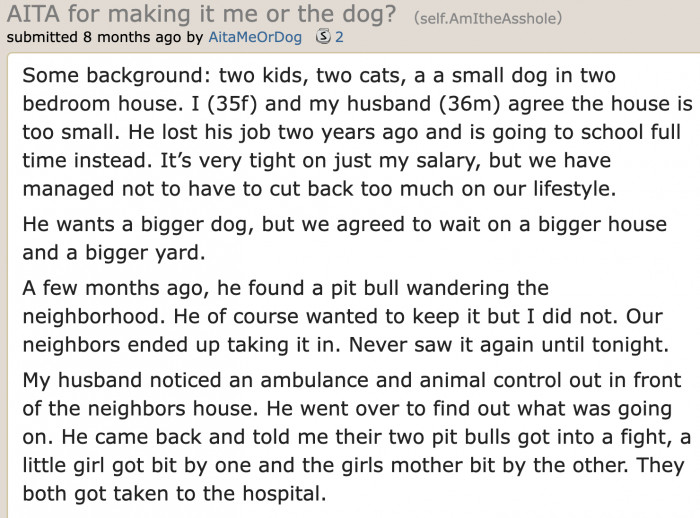
The husband took the dog without even considering the risks to his family.
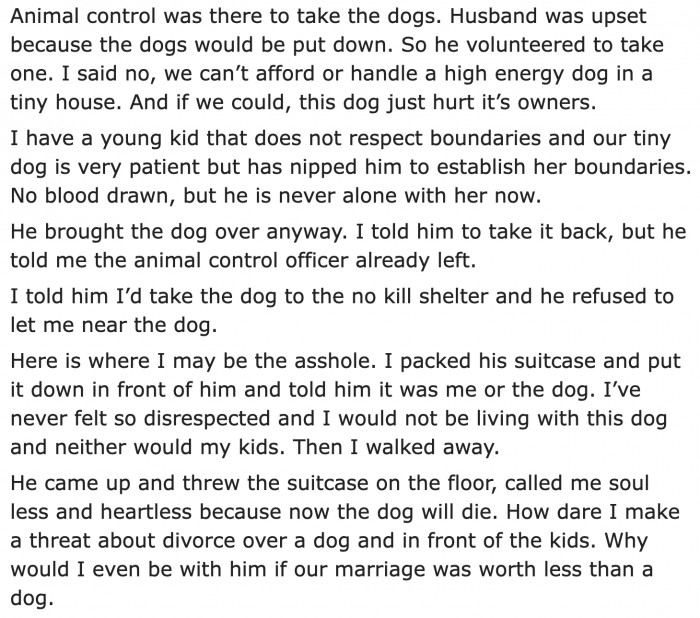
The couple isn't talking to each other since the incident.
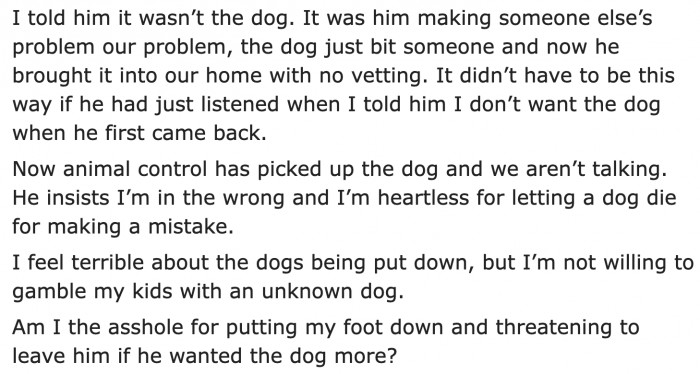
The Ethics of Pet Ownership
The decision to keep or relinquish a pet can evoke strong emotions, often rooted in ethical considerations. As noted by Dr. Esther Perel, a renowned couples therapist, "The relationships we have with our pets can mirror our deepest emotional needs and conflicts." This complex relationship often leads to moral dilemmas when welfare is concerned. This case sheds light on the responsibilities inherent in pet ownership, particularly when a pet has a history of aggression. The husband’s desire to save the dog highlights a compassionate impulse, yet it may not take into account the safety risks for others involved, as emphasized by Dr. Michele Gelfand, who states, "In situations of conflict, we must balance empathy with the need for safety and well-being for all."
Understanding Attachment and Animal Behavior
Research in the field of human-animal interactions, particularly studies from the Journal of Applied Animal Welfare Science, indicates that strong attachments between pets and owners can significantly impact both parties' emotional well-being. When faced with a decision to relinquish a pet, it often brings up complex emotions tied to attachment theory.
Dr. Emily Parker, an animal behaviorist, explains that the bond we share with pets can mirror our closest human relationships, making decisions about their care deeply emotional and challenging.
Animal control did something wrong here.
Why did they allow the man to keep the dog if it recently became aggressive?
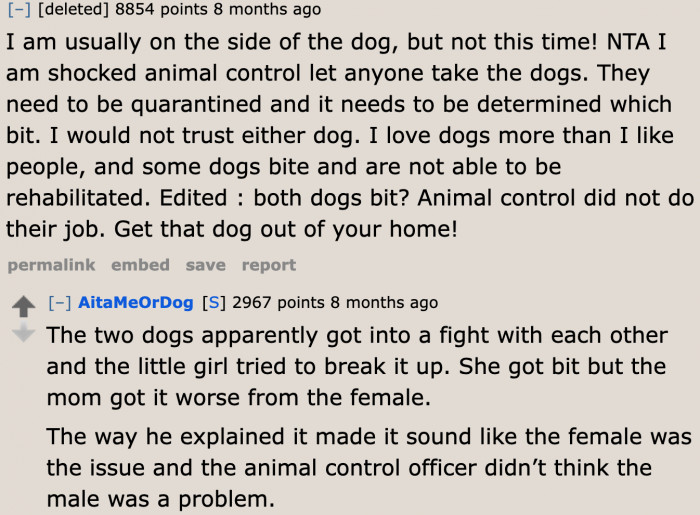
He did it only to feel good about himself.
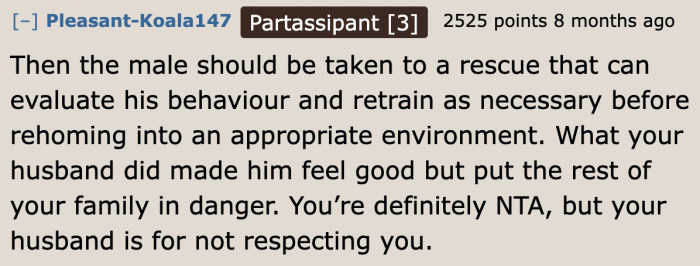
It takes qualifications to handle aggressive dogs.

Additionally, the psychological concept of cognitive dissonance comes into play, where individuals struggle to reconcile conflicting beliefs and actions. The husband may experience discomfort reconciling his love for the dog with the potential dangers it poses to family and community members.
Encouraging a dialogue about these conflicting emotions can lead to greater understanding and cooperation in decision-making regarding the dog’s fate.
The dynamics of choosing between a partner and a pet can evoke feelings of conflict and resentment, as noted in psychological studies on relational dynamics. According to research from the University of Michigan, such situations often expose underlying relationship issues, including the balance of power and emotional investment.
It's crucial for individuals to communicate openly about their feelings towards pets and their significance in the relationship, as this can mitigate misunderstandings and foster empathy.
Rehabilitation can be a solution. But this family doesn't have the means to provide the necessary environment for the pit bull.
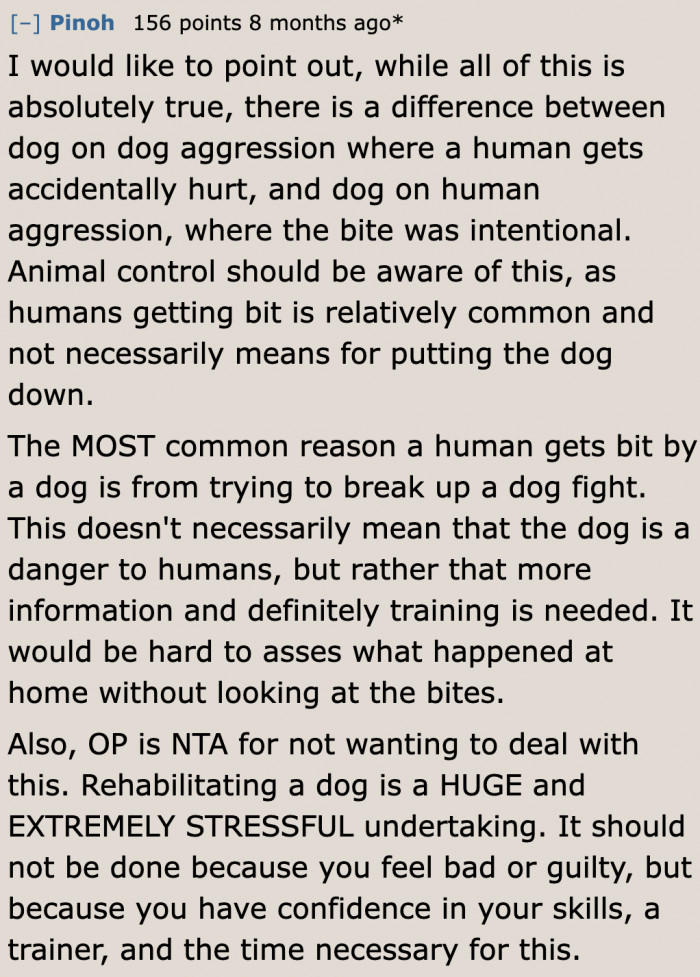
It could potentially harm their children.

The husband may think he's saving the dog. But in the end, it was a selfish act.

Understanding Aggression in Pets
Behavioral studies in veterinary psychology indicate that aggression in pets can stem from a variety of factors, including fear, territoriality, and past trauma. Understanding these root causes is essential for determining appropriate interventions.
Addressing the dog's aggression through professional training or behavioral therapy could potentially mitigate risks while allowing the family to keep the pet. Incorporating insights from animal behaviorists can provide practical solutions that prioritize safety and animal welfare.
Navigating Emotional Responses in High-Stakes Decisions
Decisions involving pets often trigger strong emotional responses due to the deep-seated attachments involved. The emotional distress associated with a pet's potential euthanasia can be compounded by guilt and fear of loss, as noted in research by the American Veterinary Medical Association.
Understanding these emotional responses can help individuals navigate their feelings more effectively, promoting healthier decision-making processes during times of stress.
Both the animal control officer and the husband are at fault in this situation.

It's a matter of priorities. The husband needs to prioritize the safety of his family.

The pit bull might attack their current dog. In other words, taking in the dog will only make the situation worse.

Moreover, the emotional toll of making such decisions can profoundly affect family dynamics. Research from developmental psychology indicates that children may internalize the stress of these decisions, impacting their emotional well-being.
Parents should consider involving their children in discussions about the dog and its behavior, providing them with a sense of agency and understanding of the situation, fostering resilience in the face of difficult choices.
Family therapy specialists advocate for open dialogue around the emotional significance of pets in family systems. By expressing feelings and concerns, family members can work towards a resolution that respects both human and animal needs.
Therapeutic approaches often include guided discussions on attachment, responsibility, and the emotional implications of pet ownership, which can lead to a more unified family decision regarding the pet.
They can always own another pit bull once their family is in a better situation.

If the dog is put down, it's not the original poster's (OP's) fault.

She already suggested an excellent solution to prevent the death of the pit bull. But her husband isn't listening.

Navigating Family Conflict
Family conflicts often arise from differing values and priorities, particularly in emotionally charged situations like this. According to Dr. John Gottman, a renowned marriage researcher, "The key to resolving conflicts is to foster open communication and understanding." In this case, setting aside time for a family meeting to discuss feelings, fears, and responsibilities regarding the dog can create a safe space for everyone to express their views and work towards a resolution.
The Role of Compromise in Relationships
In relational psychology, compromise is often seen as a pathway to greater harmony. A study from Stanford University highlights how effective communication and a willingness to understand differing perspectives can lead to mutually beneficial outcomes.
In this context, finding a solution that respects both the husband's desire to save the dog and the wife's concerns about safety can foster a healthier relationship overall, reinforcing the value of collaboration in decision-making.
In some states, a dog that bit a human will automatically be put down.

Is he even thinking about the safety of their children?

Redditors sharing some experiences with dog attacks.

Additionally, practicing active listening during these discussions can foster empathy among family members. Research points to the effectiveness of reflective listening techniques, where individuals paraphrase what others say to ensure understanding, as a tool for improving family communication.
This approach can help bridge the gap between differing opinions and encourage collective decision-making regarding the dog's future.
Pet ownership often serves as a reflection of our values and priorities. Acknowledging this can be instrumental in resolving conflicts involving pets, as it helps individuals understand the motivations behind their choices.
Encouraging self-reflection on why a pet holds significant value can lead to more profound discussions and considerations, ultimately guiding families toward resolutions that honor both emotional attachments and safety concerns.
In the first place, they're not in a situation where they can take another dog in.

Apparently, this man is always driven by his emotions when it comes to making decisions.

The second comment makes a lot of sense. /s

Considering All Options
Ultimately, the decision regarding the dog's fate should include input from all family members and consider the dog's needs. Seeking advice from animal control or behavioral specialists can provide clarity on the best course of action that respects both the animal's life and the safety of the family and community.
Research emphasizes the importance of considering all options—including rehoming to a safer environment—if necessary, to ensure the well-being of everyone involved.
The Importance of Emotional Regulation
When faced with emotionally charged decisions, individuals often experience difficulty in regulating their emotions. Psychological research shows that practicing mindfulness and emotional regulation techniques can significantly improve decision-making abilities during conflicts.
Incorporating these strategies can help individuals remain calm and focused, allowing for more thoughtful discussions about sensitive topics like pet ownership.
Reddit may be full of dog lovers. But in this situation, they sided with the OP who doesn't want to keep the aggressive dog.
It is, after all, the right decision. They simply cannot put themselves and their dog at risk.
If the husband truly wanted the best for the dog, he should have agreed to take it to a no-kill shelter.
The ethical considerations of pet ownership and the responsibilities that come with it frequently lead to heated discussions. Acknowledging the emotional and ethical implications of decisions can provide a foundation for more compassionate dialogues.
Having conversations that consider the welfare of the animal alongside human emotions can ensure that decisions are made with empathy and understanding, ultimately leading to healthier family relationships.
Psychological Analysis
This scenario illustrates the challenges of balancing emotional attachments with practical safety concerns. It’s essential for partners to engage in open dialogue about their feelings towards pets while considering each other's perspectives. Such discussions can enhance emotional understanding and lead to decisions that honor both human and animal welfare.
Analysis generated by AI
Analysis & Alternative Approaches
In conclusion, navigating the complexities of pet ownership and relationships requires a deep understanding of attachment, emotional regulation, and compromise. Research published in various psychological journals emphasizes the importance of communication and empathy in resolving conflicts.
By integrating these principles into family discussions, individuals can foster healthier relationships and make more informed decisions regarding their pets.
Analysis & Alternative Approaches
In conclusion, navigating the emotional complexities of pet ownership requires balancing compassion with ethical responsibilities. Research shows that involving all family members in discussions can foster understanding and better decision-making.
Ultimately, prioritizing safety while also considering the dog's welfare is crucial in resolving such dilemmas.



